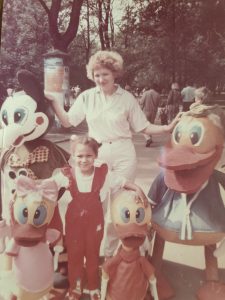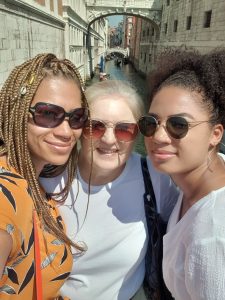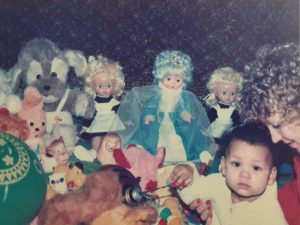In Liminal Space Part 3
Written by Nina Camara
In Liminal Space is a series of interviews focusing on the liminality of the mixed race experience and the ways people deal with its challenges. The series highlights stories of people who left environments which did not reflect their story in the hope of creating a new beginning ‘between the known and the unknown’.
In our third story, we talk to Angela who was born in Russia and moved to London as a young child. The decision to leave was made by her mother who felt that this was a place where her mixed race daughters would have a better life and more opportunities. Despite the challenges they faced, she and her family found a way of embracing their new home whilst preserving their cultural heritage.
Life Back Home
Describe the place where you grew up. What was it like in terms of cultural and ethnic make-up?
I was born in St Petersburg, Russia in the late 80s where there weren’t a lot of black or mixed people. My mother is Russian and my dad is Ghanaian. My family moved to London when I was five so I don’t have many memories of actually growing up in Russia. However, speaking to my mum she said that we lived a comfortable life. There were occurrences when she got horrible things said to her about me, herself or my dad. However, most people didn’t cause us any trouble which was surprising as it was the‘80s.
What are your memories of growing up in this community?
My mother said she felt that she couldn’t trust many people. As there weren’t many mixed children at the time, and because of the occasional racist remarks, she mostly felt like she didn’t have much help at hand and as a result of this became more protective. My mother mentioned that she and my dad had known a lot of people from different backgrounds and it was easy to come across people of colour in St Petersburg at the time. It was mostly because a lot of students at the time were from different countries.
When you now return to Russia and compare your experiences from back then, have the attitudes towards you changed? If so, in what sense?
I returned to Russia when I was 15 and this time it was to a suburban town with not much diversity. I remember a lot of people staring at me and my sister during this trip, but that was pretty much it. Luckily, we had no racist things said to us, so my mum felt at the time that there had definitely been some progress in Russia.
Leaving Home
Where is home for you now?
London is my home.
When did you first come to London and can you describe the circumstances?
I came to London in the early 90s and this was mainly because my mother wanted a better life with more opportunities. My mother felt that we would live a happier life in a country that was more ahead in terms of diversity and inclusion.
Life in a New Place
How did you find adapting to the new culture? Was it easy to fit in?
When I arrived in London, I had to start learning English. I remember going to school and learning English, trying to find my way, learning how to communicate. My mother said I learned very quickly and soon became a great English speaker and writer. The great thing about children is that in most cases they’re not filled with biases, so I found it easy to make friends. I remember loving school, and spending time with my friends from different backgrounds, which was also easy thanks to the diversity of Peckham, where we lived.
Have you ever experienced any culture clash because of your background?
Growing up I found it easy to navigate life with my two cultures. My mother is a very strong Russian woman who holds strong values and taught me about Russian culture and always spoke Russian at home. I always felt connected to my Russian side because of how my mother raised me. My Ghanaian background was a different story. Unfortunately, my mother and father split and all of a sudden I was left with no access to my Ghanaian side. However I never felt like I completely missed out on Ghanaian culture due to growing up in Peckham. South London is a beautiful place filled with so much diversity and even though I didn’t know my Ghanaian side that much, I had friends with African backgrounds and so I learnt about African culture through these friends and also through society in Peckham.
Is there an aspect of Russian culture you / your family want to preserve?
Absolutely! Food is an important aspect of culture that I want to preserve in my life. Luckily there are a number of Eastern European food shops in London and I have one close to me that I visit frequently. I ensured my fiancé learned about Russian food (mostly through my mum’s cooking lol), and we always make sure we have some Russian food in the fridge. It’s always been important for me to stay connected to my Russian culture, whether it’s through language, food, celebrating holidays and living with Russian values.
If you could sum it up, how did life in the UK shape you as a person?
I think London has helped shape me as a person, not necessarily the rest of the UK. There is definitely a divide between London and other regions of the UK, where London is far more diverse and accepting of different cultures. Whereas I find other parts of the UK may not always be so accepting. Growing up in a diverse city, I never felt alone or different, although many believe my background is quite unique.
I only felt differences during school days, having to fight with black girls for being a ‘stuck up lightie’ or never feeling ‘black enough’. These are things I struggled with in the past – with trying to be accepted. Looking back, I think I had many of these occurrences, but I also had met accepting black girls who fought my corner.
I think life in London is a privilege because there are so many people from different cultures, and I’ve got many people in my life that accept me for who I am and the identity I hold. I don’t think that would have been the case if we stayed in Russia.
How do you perceive your country of birth now? Do you come back often?
I still feel connected to my country of birth and I’m so proud of being a Russian Mixed-Race woman. I feel that Russia is still behind in terms of diversity but it’s definitely much better now than in the 80s. I feel so proud for having a mother who stood up for love and her rights, and didn’t let society dictate who she should be with. It was a bold and strong move for that time and I’m proud to have her as my mother. I haven’t been to Russia for the past 10 years, mainly because we just never found the time, but also because my mother just wasn’t that keen for a while which I understood. However, we’ve made plans to go again and so I hope to visit my family soon.






I found this account surprising. My impression-admittedly based on anecdotal accounts-was that Russia was generally more accepting of African migrants under Communism compared to more recently. This account seems almost rose-tinted in light of the stories of the horrific treatment of African migrants in contemporary Russia.
It is telling that the author speaks of ‘African culture’ -a problematic term in and of itself, given it’s not a monolith. It’s clear that her mother’s culture has dominated, as is often the case even when parents are still together. It’s a shame she was disconnected from the Ghanaian side. There’s not much of an insight into why that was. It’s hard enough in a western context to transmit culture; even if both parents are of African heritage, let alone if one is absent. There has to a proactive engagement or it falls by the wayside.
Lastly, the ‘stuck-up lightie’ comment, for all its apparent insensitivity, needs to be contextualised. As a fellow 80s baby, colourism was an issue growing up. It clearly still is. Sadly, divisive stereotypes prevailed according to skin-tone. Darker skinned women bore the brunt, being on the ‘wrong side’ of the so-called ideal.